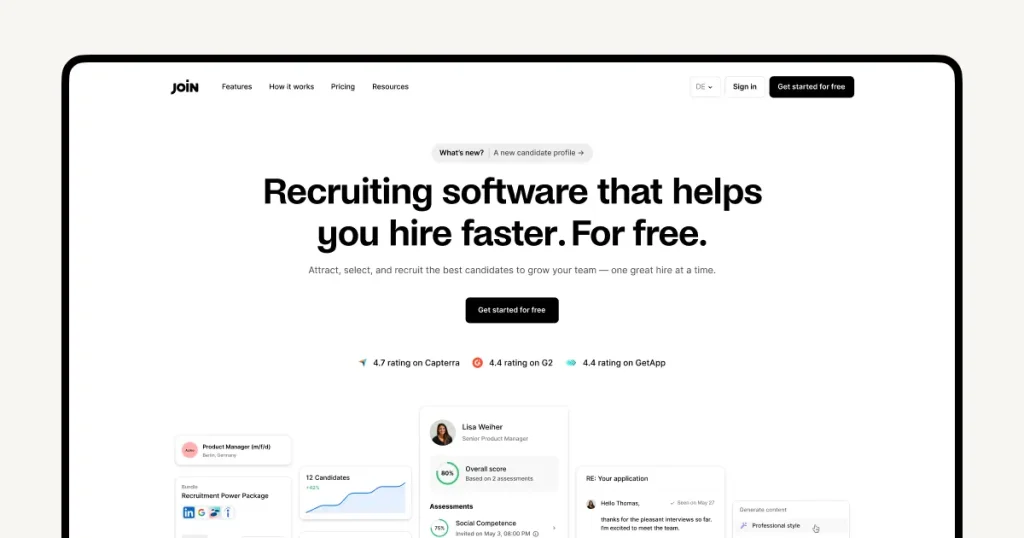Best interview questions for your hiring process
Carpenter Interview questions
Carpenters are woodworking experts who can craft furniture, tools, structures and other products from different types of wood. They can work closely with a wider construction team to help bring a project together, or individually to craft smaller pieces.
You should seek these skills in your Carpenter:
- Previous experience in a Carpenter or woodworking position.
- Trained and able to use a variety of woodworking tools.
- High level of attention to detail.
- Ability to read and use technical drawings and design plans.
- High level of understanding of construction and equipment safety procedures.
- Strong problem-solving skills.
Interviewing a Carpenter
Since a Carpenter has such a specialised skill set, which will directly impact the quality of the product that your customer or client receives, hiring the right person is crucial!
To help you pinpoint this person, we’ve put together a guide for use early on in the interview process. Here, you’ll find example questions to ask a Carpenter, which will help you to quickly decipher whether you should continue with the process.
How to open the job interview
Putting your potential hire at ease as soon as possible will help the conversation to flow naturally, and give you a genuine overview of their skills and personality.
Plus, it is super easy to do. Simply asking some upbeat and easy starter questions can help to get the interview warmed up before delving into the deeper topics.
Best interview questions for your hiring process
See our Carpenter job description hereFor the interview
A positive opener to start
What do you enjoy most about being a Carpenter?
How did you get your career in woodworking started?
Behavioral Questions
Tell me about your previous working environments, what have you learnt from them?
Tell me about a time you’ve not been happy with the way a project turned out, what did you do, and how did you learn from this?
Not every project will turn out perfectly. Here, you’re looking for a Carpenter’s ability to analyse their work, use their attention to detail to make any relevant changes and note down some ways in which they can avoid making the same mistakes in the future.
How do you stay up to date on the latest trends in the ever-changing Carpentry industry?
As woodworking is constantly changing, you want a candidate who will be able to keep up the pace! This could be by attending workshops, events or subscribing to relevant literature.
Tell me about an experience you have had when working with a particularly difficult client or customer, how did you overcome this while still staying professional?
Clients will constantly differ in personality types. Sometimes this can be difficult! Your candidate should know the right questions to ask to help get their project right while minimising mistakes. They should also have some coping techniques for these situations. You’ll also gain some insight into their experience here.
Soft Skills
When working on a larger project with multiple team members, some of who disagree with your techniques or processes, how do you streamline communication?
Carpenters will sometimes work collaboratively. So knowing they have the people skills to take a colleague’s comments on board while utilising their expert knowledge to ensure best practices is crucial.
If tasked with a project which you weren’t confident you could produce, what would you do?
Honesty and communication are key here. The candidate should be comfortable letting their lead or client know that the task is a challenge for them. And, their communication skills should be good enough for them to ask for help on the task from someone with the knowledge to complete the task.
What skills can you bring to this Carpenter position that put you ahead of other candidates?
Confidence is key here! If a candidate can easily list off a number of soft or hard skills that are relevant to the role, this is a good sign. You may also get an insight into some specific skills that you hadn’t previously considered.
Occasionally, you may have to communicate technical ideas or plans to a person with less technical knowledge than you. How do you deal with this?
Here you’re looking for some communication techniques, such as the use of diagrams to talk through technical terms and frequent check-ins, that show you that a candidate has the people skills to deal with this situation.
Hard Skills
Which woodworking tools are you most comfortable using and why?
Here, you’ll get an idea of whether the tools your candidate has experience with match up with your current workspace. You’ll also be able to predict what the candidate needs onboarding on and what new skills they can bring to your team.
Which types of project designs have you followed in the past? For example, physical blueprints, technical drawings or digital designs?
Again, this will give you an idea of how a candidate’s past work will aid them in your business.
What safety training have you received in the past?
Safety is a priority in all construction businesses. Knowing your candidate has undergone training to keep their safety knowledge up to date is essential.
Would you say that you specialised in any areas of woodworking?
Depending on your business, this may not be an essential question. However, it is always good to know whether a new hire has finely tuned skills that can be brought to your team.
How do you test and maintain your equipment to ensure high safety standards?
Regular maintenance checks and cleaning and properly storing tools and equipment help to keep a workshop or construction site safe. This question will check whether your candidate has this knowledge under their belt!
Operational / Situational Questions
Imagine you are working collaboratively with a colleague on a project and noticed they were making a number of safety mistakes. What would your next steps be?
Here, you’re looking for a candidate’s confidence to speak up as well as their team-working skills. They should be able to properly demonstrate to their colleague what the correct method of their task is and why this should be done.
Imagine you are tasked with cutting and measuring some extremely large timber, what safety steps would you take here?
An experienced candidate should be able to list some critical safety steps they can take in this situation. They should include tools, protective equipment and methods they’d use in this scenario.
Imagine you receive some critical feedback from a superior on a project you have been working on, how do you handle this?
Here, the candidate should mention asking for actions from the feedback and setting targets for future work. This will ensure they are constantly learning and improving their craft.
When working independently on a large task, how would you ensure your work was quality assured?
The candidate should list some ways in which they quality check their own work, such as measuring separate parts.

Start hiring and prepare your interview
All platforms are available for you to promote your job through JOIN.
Create job ad for free


Carpenters can find themselves working in a large variety of work environments. From large on-site construction areas to smaller, less-crowded workshops. Knowing what environments your Carpenter is experienced in and what skills they have picked up from these can help you to envision their place in your business.